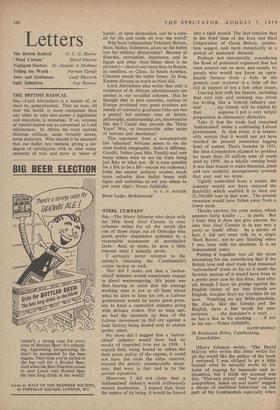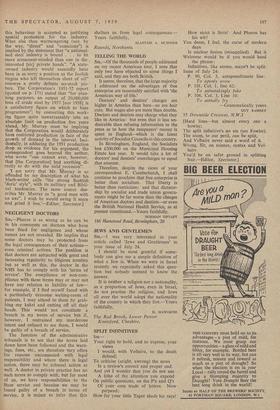'STEEL CURTAIN'
Si,—The Harry Johnson who deals with my little book Steel Curtain in your columns writes for all the world like one of those chaps out of Oxbridge who much prefer disputative polemics to a reasonable assessment of marshalled facts. And, at times, he goes a little beyond what I actually wrote.
I certainly never referred to the enemy's (meaning the Continentals') unfair tactics as such.
Nor did I make out that a 'nation- alised' industry would consciously engage in direct warmongering. My point was that bearing in mind that the average working man is not at all fussy about what he does to keep his job, a Labour government would be under great press- ure to keep a controlled industry going with defence orders. Not so long ago, we had the spectacle up here of the Labour movement in full cry against a tank factory being turned over to atomic power plant.
No more did I suggest that a 'nation- alised' industry would have had no stocks of imported iron ore in 1939. I argued that, being bound to reflect the then peace policy of the regime, it could not have put aside the extra reserves, beyond the strictly commercially neces- sary, that were in fact laid in by the private operators.
Moreover, I did not claim that a 'nationalised' industry would deliberately restrict production. I argued that, from the nature of its being, it would be forced
into a rigid mould. The fact remains that in the brief time of the Iron and Steel Corporation of Great Britain, produc- tion sagged, and most remarkably in a period of sustained demand.
Perhaps not unnaturally, considering the flood of polemical argument that has been poured out on steel, and mostly by people who would not know an open- hearth furnace from a hole in the ground, your reviewer is a little off the rail in respect of not a few other issues.
Leaving him with his fancies, including that very rich and amusing one about me writing like a 'retired infantry cap- tain' . . . my friends will be kittled by that . . . suppose I put a very simple proposition in elementary dialectics.
Take it that the trade had remained 'nationalised' under a continuing Labour government. In that event, it is reason- ably certain that it would not yet have reached its present somewhat lagging level of output. That's because in 1951, the then Corporation planned to produce no more than 20 million tons of crude steel by 1958. As a wholly owning body it was thus bound to make financial, plant and raw material arrangements towards that end, and no more.
Tightly controlled from a centre, the industry would not have enjoyed the flexibility which enabled it to turn out 21,700,000 tons in that year. The present recession would have fallen away from a lower peak.
Thanks anyway, for your notice, which appears fairly kindly . . . in parts. But I trust that it does not give anyone the idea that Steel Curtain is in any way a party or 'trade' effort. As a matter of fact, I did not even talk to a single 'Steel Baron', nor to any 'hireling' when I was busy with my machine. It is an independent essay.
Putting it together was all the more interesting for me, considering that if the British iron and steel trade had remained 'nationalised' (even so far as it went) the Scottish section of it would have been in a pretty poor case by this time. And after all, though I have no grudge against the English (many of my best friends are English, imagine that) my loyalties lie up here. Touching on my Bible-punching, the Gaels, like the Greeks and the English, have a few words for your reviewer . . . tha dearganien a osan . . . he has a flea in his stocking . . . if not in his ear.—Yours faithfully,
DAVID MURRAY
38 Buchanan Drive, Cam buslang, Lanarkshire.
[Harry Johnson writes: 'The David Murray who writes This letter writes for all the world like the author of the book I reviewed. I was obliged to go a little beyond what he actually wrote by his habit of arguing by innuendo and in- sinuation, but I think my account was fair. "Fire-sale prices" and "not ordinary competition, based on real costs" suggest a charge of unethical behaviour on the part of the Continentals especially when
this behaviour is accepted as justifying special protection for the industry. What else than warmongering (not, by the way, "direct" and "conscious") is implied by the statement that "a national- ised steel industry is bound . . . to be more armament-minded than one in dis-, interested [sic] private hands". "A state- owned industry would assuredly have been in as sorry a position as the foolish virgins who left themselves short of oil" conveys a pretty definite no-stock pic- ture. The Corporation's 1951-52 report (quoted on p. 171) stated that "for plan- ning purposes, an output of 20,000,000 tons of crude steel by 1957 [not 1958] is a satisfactory figure on which to base programmes"; by converting this work- ing figure quite unwarrantably into an absolute limit on production five years ahead, Mr. Murray must be implying that the Corporation would deliberately have restricted production in face of the growth of demand in the interval. Inci- dentally, in adducing the 1951 production drop as evidence for his argument, the correspondent goes beyond the author, who wrote "one cannot aver, however, that [the Corporation] had anything di- rectly to do with the mild recession".
'I am sorry that Mr. Murray is so offended by my description of what his blurb-writer calls "the strong Scottish 'done' style", with its military and Bibli- cal tendencies. The same source des- cribes Mr. Murray as "a good man with an axe". I wish he would swing it more and grind it less.'—Editor, Spectator.]



























 Previous page
Previous page